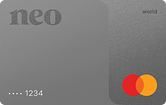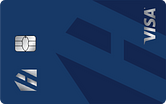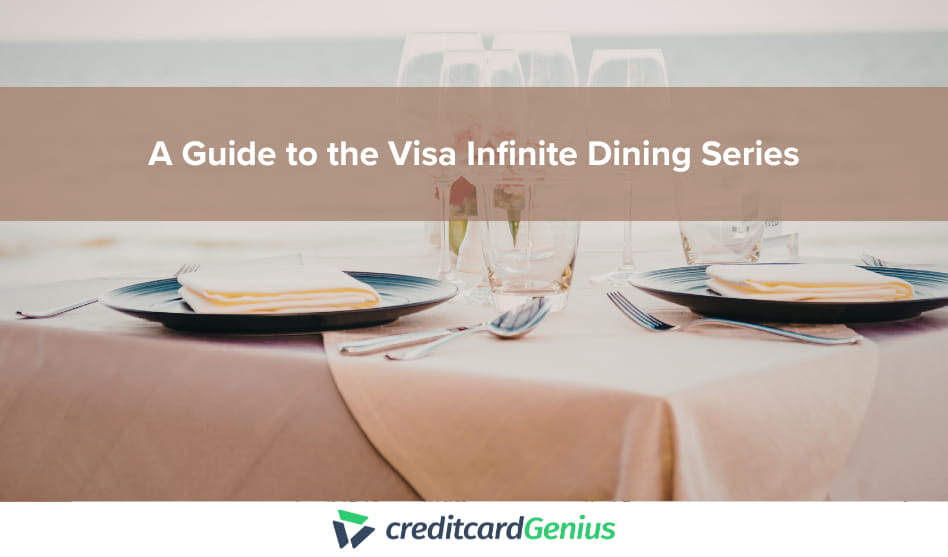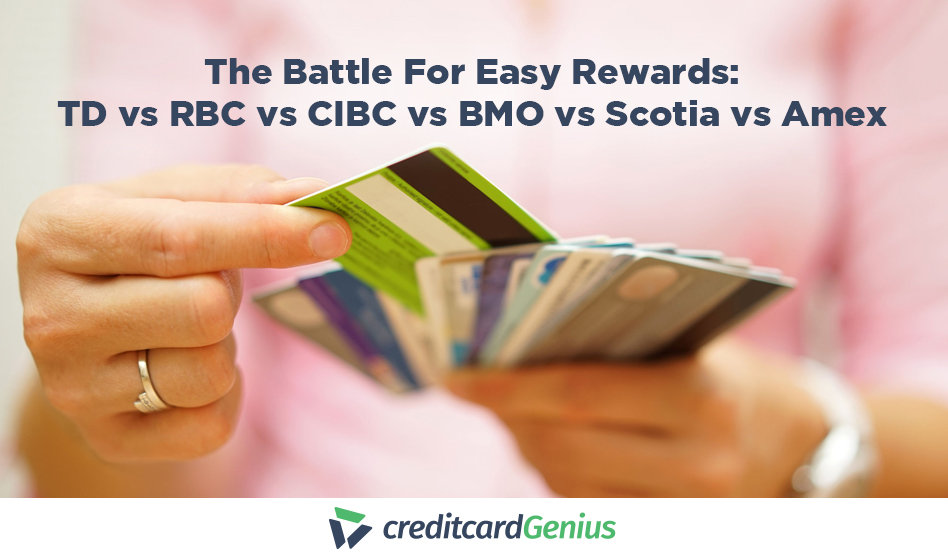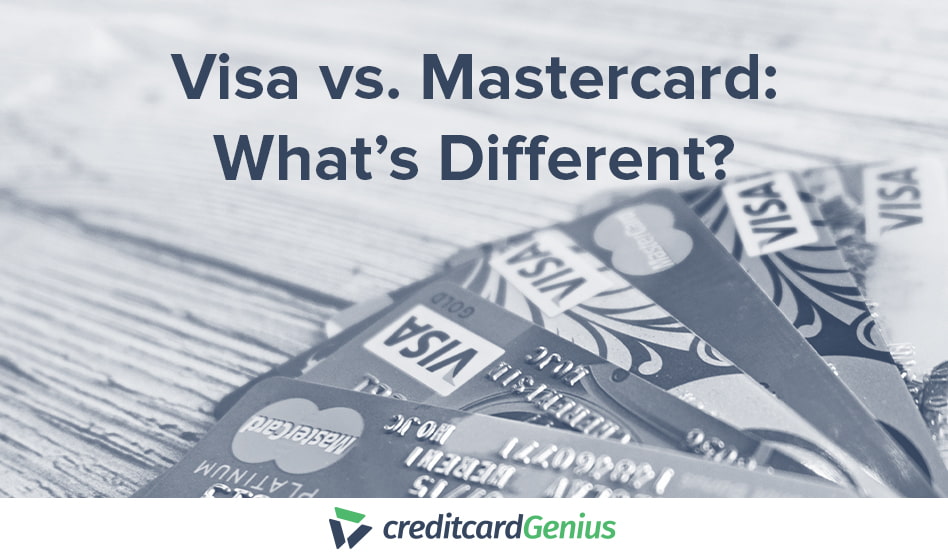Best Challenger Bank Credit Cards for 2026
The best credit cards offered outside of the Big 5 Canadian banks.
The best challenger bank credit card is the Neo World Elite Mastercard. The Rogers Red World Elite Mastercard and Neo World Mastercard are also top options from other non-traditional institutions.
| Credit card | Annual fee | Average earn rate | Insurance coverage | Rewards | Current offer | |
|---|---|---|---|---|---|---|
| #1 | Neo World Elite Mastercard | $125 | 2.55% | 12 | * Average of 5% cash back at partner retailers * 5% cash back on groceries, up to $1,000 spent monthly * 4% cash back on recurring bills, up to $500 spent monthly * 3% cash back on gas and EV charging, up to $1,000 spent monthly * 1% cash back everywhere else | None |
| #2 | Rogers Red World Elite Mastercard | $0 | 1.5% | 6 | * Earn 2% unlimited cash back on all eligible non-U.S. dollar purchases if you have 1 qualifying service with Rogers, Fido, Comwave, or Shaw * Earn 1.5% unlimited cash back on eligible non-U.S. dollar purchases * Earn 3% unlimited cash back on all eligible purchases made in U.S. dollars | None |
| #3 | Neo World Mastercard | $0 | 1.35% | 2 | * Average of 5% cash back at partner retailers * 2% cash back on groceries, up to $1,000 spent monthly * 2% cash back on recurring bills, up to $500 spent monthly * 2% cash back on gas and EV charging, up to $1,000 spent monthly * 0.5% cash back everywhere else |  $50 GeniusCash + None $50 GeniusCash + None |
Challenger cards may not be backed by traditional big banks, but the best ones still offer astonishingly valuable rewards, large insurance packages, and low and no-fee options that rival those from the top mainstream issuers. Luckily, our data-driven Genius Rating helps us narrow things down and identify the most impressive of the bunch.
We're here to help you determine whether a challenger credit card is right for you and, if so, which one is the best fit. The following article highlights our favourite challenger credit cards and explains the key factors to consider when weighing your options.
Key Takeaways
- The best challenger bank credit card in Canada is the Neo World Elite Mastercard.
- The best challenger bank credit cards provide high rewards rates and benefits like insurance coverage or low foreign exchange fees, but lesser cards sometimes lack the perks offered by big bank cards.
- To determine the best challenger bank credit card for you, consider how the rewards structure aligns with your spending habits and make sure the annual fee is worthwhile, if there is one at all.
The best challenger bank credit cards in Canada
Our Gold award for the best challenger bank credit card in Canada goes to the Neo World Elite Mastercard for its impressive cash back rate and generous insurance package.
Our Silver award goes to the Rogers Red World Elite Mastercard, largely thanks to its high earn rate for U.S. dollar purchases and bonus cash back for eligible Rogers, Fido, and Shaw clients.
And our Bronze award goes to Neo World Mastercard with its simple-yet-valuable flat rates and $0 annual fee.
We also want to highlight the Home Trust Preferred Visa as a solid challenger bank card that doesn't charge foreign exchange fees – and also doesn't charge an annual fee for the privilege.
The #1 challenger bank credit card in Canada: Neo World Elite Mastercard®
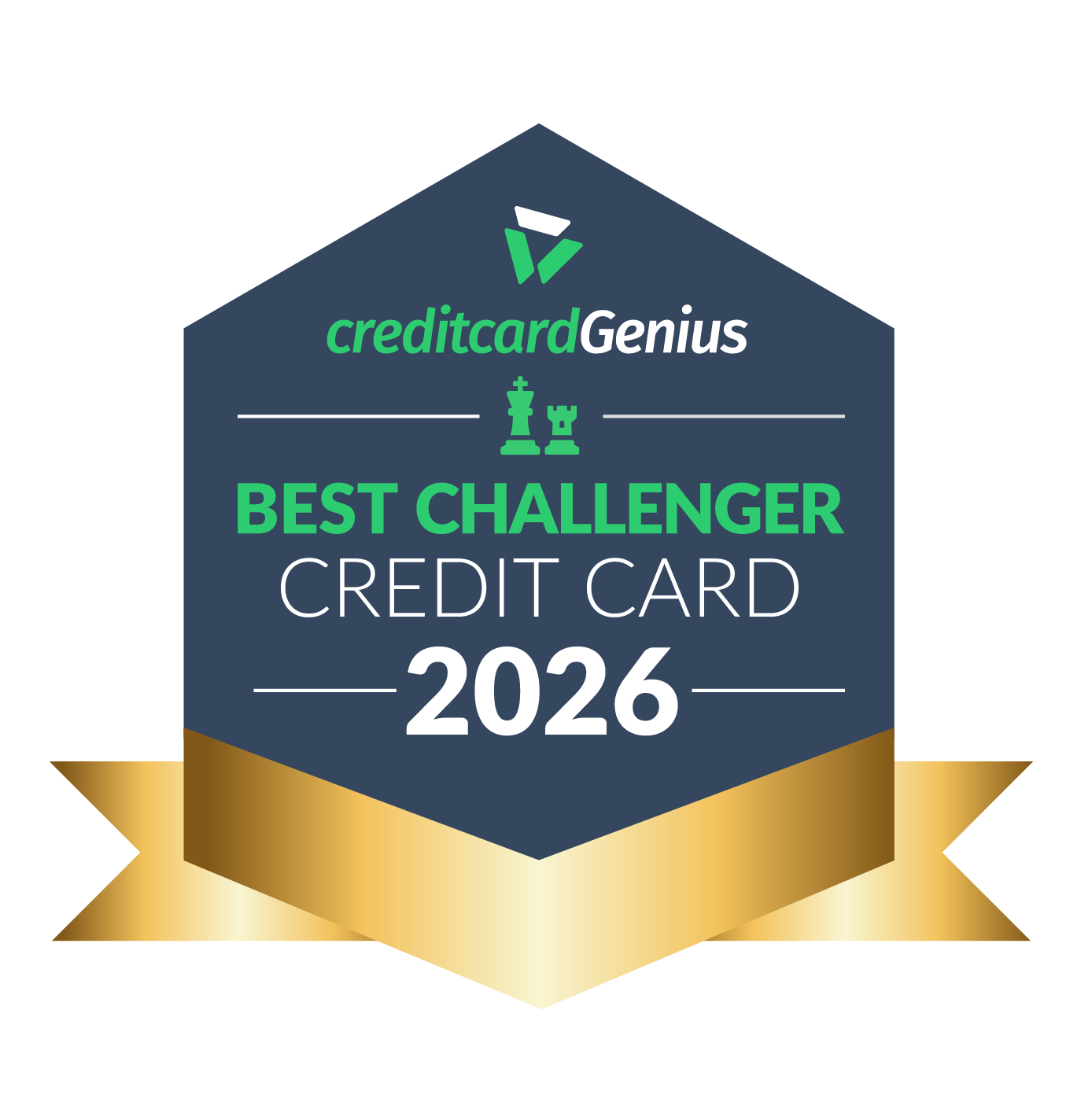
The Neo World Elite Mastercard® offers incredible rates for all categories where Canadians spend the most: 5% cash back on groceries, 4% back on recurring payments, and 3% back on gas. And you'll still earn 1% back on everything else. It's no wonder this challenger bank card makes the list of Canada's best cash back cards.
Our top challenger card includes a generous insurance package with 12 types of insurance. This includes the usual purchase protection and extended warranty coverage, plus travel insurance like emergency medical coverage, baggage delay, and rental car theft and damage protection.
As a World Elite Mastercard, this card also provides exclusive benefits such as complimentary concierge services, airport lounge access, exclusive offers and upgrades through Mastercard World Experiences, and more.
Canada's silver-winning challenger bank credit card: Rogers Red World Elite® Mastercard®
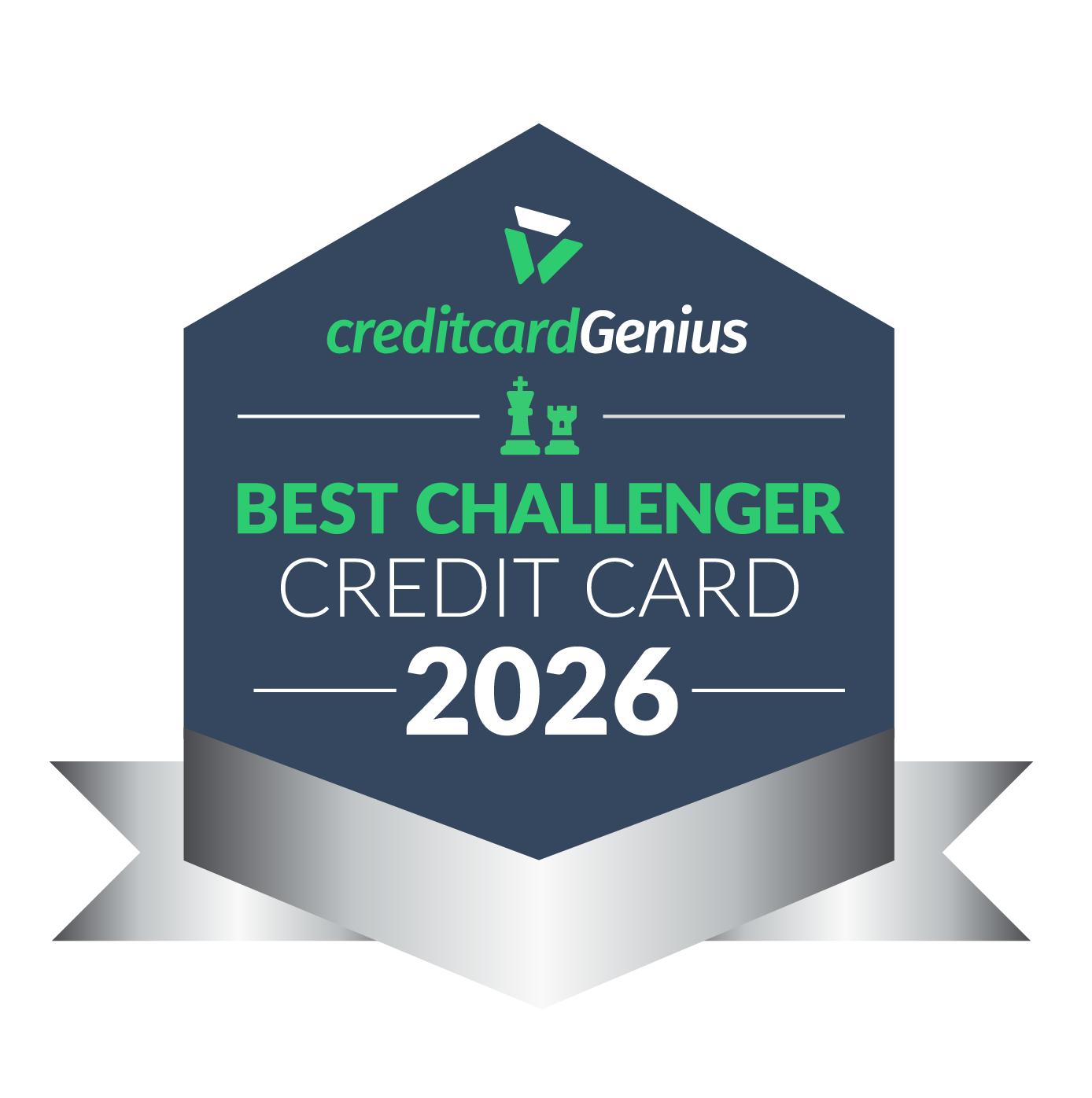
Our silver award winner, Rogers Red World Elite® Mastercard®, is a no-fee card that earns cash back in unusual, but lucrative ways. If you shop in the U.S., you'll earn a whopping 3% cash back, putting you ahead even with the 2.5% foreign exchange fee. For non-U.S. dollar purchases, cardholders enjoy either 1.5% or 2% cash back, depending on whether they subscribe to a Rogers, Fido, or Shaw service.
Users can redeem their cash back on demand, a fantastically convenient feature. Plus, if you use your cash back towards statement credits for your Rogers services, you'll get a 50% bonus. These features become even more valuable when you consider that this card doesn't charge an annual fee.
It's also earned spots on our lists of Canada's best no-fee cash back cards and best credit cards for Costco.
Canada's bronze-winning challenger bank credit card in Canada: Neo World Mastercard®
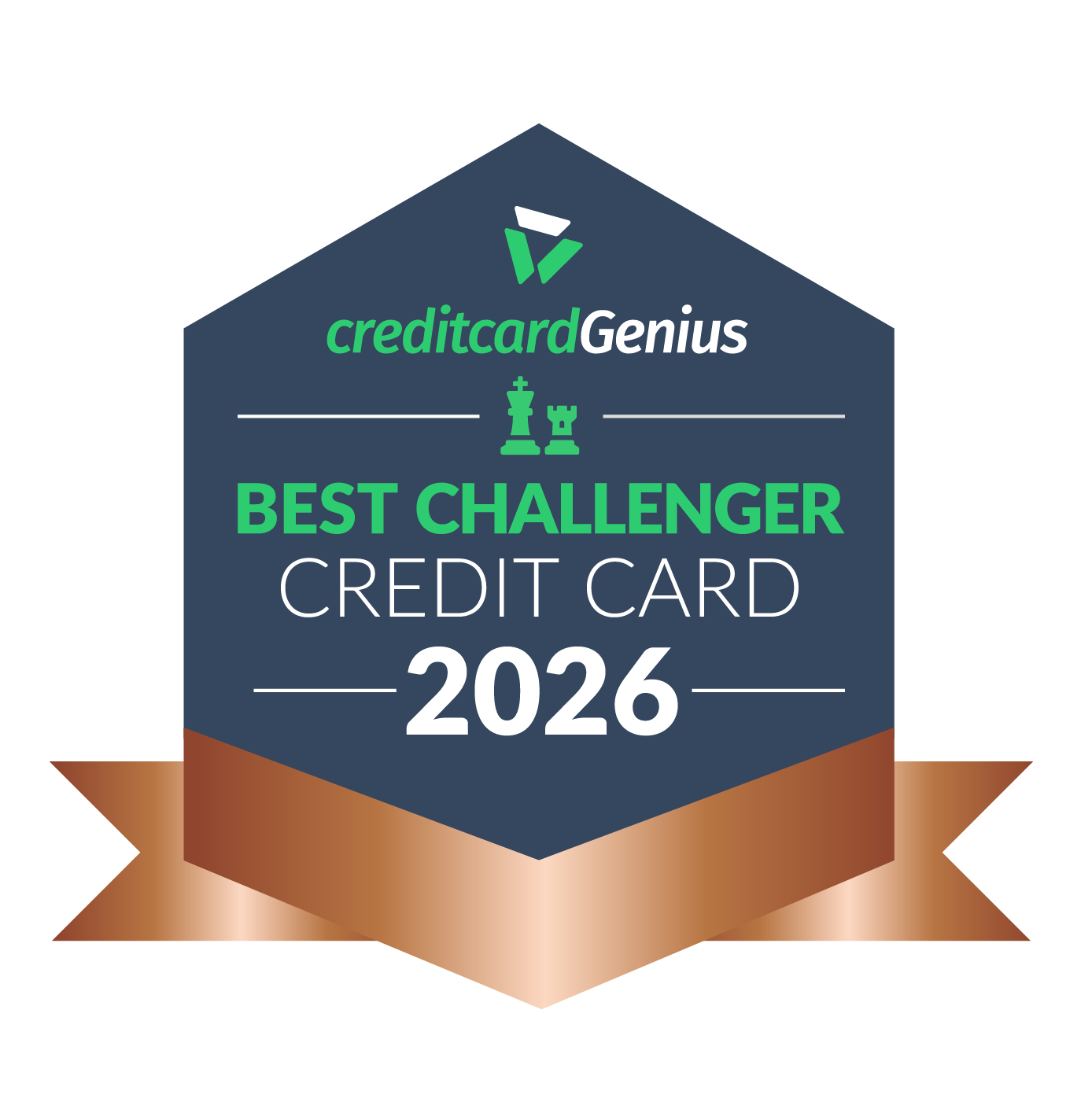
Our bronze-winning card, the Neo World Mastercard®, is another card issued by Neo, but with slightly less impressive earning potential than the World Elite version – emphasis on slightly. Users appreciate the steady 2% cash back on gas, groceries, and recurring bills, plus 0.5% on everything else. They also appreciate that they can redeem their cash back at any time.
As a World Mastercard, this Neo card does come with some sweet perks, but they're slightly less impressive than what its World Elite Mastercard counterpart offers. Still, concierge services, car rental discounts, and hotel upgrades are nothing to sneeze at.
This card even has a secured version available, the Neo Secured World Mastercard®. It's a worthwhile alternative for anyone trying to avoid credit card debt, just beginning to establish credit, dealing with poor credit, or a multitude of other situations.
The best challenger bank card for no foreign transaction fee: Home Trust Preferred Visa
If you know you'll primarily be using your credit card abroad, consider the Home Trust Preferred Visa. There's no annual fee, and you can avoid the usual 2.5% foreign exchange fee on your foreign purchases. In fact, this card earns honourable mention as one of Canada's best foreign exchange cards.
Even if you decide to use the card at home here in Canada, you'll earn 1% cash back on all purchases. Perhaps the most surprising feature of this card is that there are no caps on how much cash back you can earn.
Compare all top challenger bank credit cards by Genius Rating
To determine the top challenger bank credit cards, we use our math-based algorithm to generate a Genius Rating – a score out of 5 – for all
For this category, however, we were diligent in considering only credit cards issued by institutions other than big banks and credit unions.
Here's how the best challenger bank credit cards rank when listed by Genius Rating:
The Genius Rating methodology
Our Genius Rating analyzes over 126 features of each card across seven main categories, assigning different weights to each category for each class of cards we study.
For challenger cards, the category weighting is as follows:
- Rewards: 31%
- Fees: 20%
- Insurance: 16%
- Perks: 16%
- Interest: 7%
- Acceptance: 5%
- Approval: 5%
Learn more about our Genius Rating methodology
How to choose the right challenger bank credit card
Choosing a challenger bank card is similar to selecting a card from any other type of issuer, requiring you to consider your spending habits, preferred rewards, fees you're willing to pay, etc.
While some types of credit cards, like cash back cards and foreign exchange cards, require that you focus heavily on one of our seven categories (mentioned above), challenger bank cards are a bit different. Since these cards have many of the same features as those from typical issuers, there isn't an obvious category to consider.
Therefore, ask yourself: how can this credit card help me maximize my spending? Usually, the answer to this can be found in the card's rewards-earning system.
Rewards
A card's rewards system determines the type of rewards you'll earn on your credit card spending and, often, a more important factor, how much you'll earn. All of the items on our list of best challenger bank cards are cash back cards, so comparing their earn rates and reward categories is important.
If you don't want cash back and prefer rewards paid out as points, consider flexible rewards credit cards.
As our gold-winning card, the Neo World Elite Mastercard has the highest earn rates, therefore offering the best rewards. Still, take a look at this table to compare how rewards work for our top four challenger bank cards:
| Credit card | Rewards structure | Redemption options | Average rate of return |
|---|---|---|---|
| Neo World Elite Mastercard | * Average of 5% cash back at partner retailers * 5% cash back on groceries, up to $1,000 spent monthly * 4% cash back on recurring bills, up to $500 spent monthly * 3% cash back on gas and EV charging, up to $1,000 spent monthly * 1% cash back everywhere else | * Cash back as a statement credit | 2.55% |
| Rogers Red World Elite Mastercard | * Earn 2% unlimited cash back on all eligible non-U.S. dollar purchases if you have 1 qualifying service with Rogers, Fido, Comwave, or Shaw * Earn 1.5% unlimited cash back on eligible non-U.S. dollar purchases * Earn 3% unlimited cash back on all eligible purchases made in U.S. dollars | * Cash back as a statement credit * Statement credits for Rogers services | 1.5% |
| Neo World Mastercard | * Average of 5% cash back at partner retailers * 2% cash back on groceries, up to $1,000 spent monthly * 2% cash back on recurring bills, up to $500 spent monthly * 2% cash back on gas and EV charging, up to $1,000 spent monthly * 0.5% cash back everywhere else | * Cash back as a statement credit | 1.35% |
| Home Trust Preferred Visa | * 1% cash back on all purchases | * Cash back as a statement credit | 1% |
This chart provides another way to compare our top cards' average earn rates:
Tip: No matter what credit card you use, you could be earning bonus cash back on top of your card's rewards. Input your monthly spend in the GeniusCash app, and level up to earn real cash.
Fees
When considering credit card fees, it's essential to weigh the anticipated benefits and value against the card's cost. If you don't plan on using the credit card often, a no-fee card might be the way to go.
Most of the cards on our list of best challenger bank options are no-fee credit cards, except the Neo World Elite Mastercard. Yes, the annual cost is the most important one, but there are, of course, many smaller and sneakier credit card fees to consider:
- Foreign transaction fees
- Supplemental card fees
- Interest rates
- Balance transfer fees
- Overlimit fees
- Statement reprint fees
Especially if you find yourself trying to decide between no-fee challenger bank cards, looking at and comparing these fee details can help make your choice a bit easier.
Insurance
The accompanying insurance coverage can add substantial value to your card, and often offset the annual fee.
The two World Elite Mastercards on our list offer the most generous insurance packages. The Neo World Mastercard just offers extended warranty and purchase protection, and the Home Trust Preferred Visa simply provides 90 days of purchase protection.
Here's a comparison of the estimated value of the insurance coverage offered by the top two challenger bank cards:

It's worth noting, though, that while the Neo card's insurance value is slightly more than the Rogers card, the Rogers Red World Elite Mastercard also provides emergency medical coverage for those over age 65. The Neo World Elite Mastercard doesn't provide this at all. Therefore, the Rogers card is the better choice for seniors looking for travel insurance.
Perks
Credit card perks aren't essential, but they definitely add significant value to most credit cards.
While World Elite cards on our best challenger bank cards list offer the best perks, the other two have their own benefits. For instance, the Neo World Mastercard is available as a secured card for just $5 per month, and the Home Trust Preferred Visa offers the surprising convenience of guaranteed hotel reservations – you can request a room just about anywhere in the world and a room will be held for you, even if you arrive late.
Here are a few examples of the most noteworthy perks available:
- Welcome bonuses: None of our top challenger bank cards have welcome offers, but it's still something to be aware of. Other cards have bonuses worth $1,700, perhaps even more.
- Free supplemental cards: The Neo World Elite Mastercard and Rogers Red World Elite Mastercard offer free cards for authorized users on your account, saving you significant money and adding to your ability to earn rewards.
- Concierge services: The World Elite Mastercards on our list both come with concierge service, providing you with the kind of convenience and assistance that's tough to put a price on.
- Travel-focused perks: Free or discounted companion flights, airport lounge access, priority check-ins and boarding for flights, and many more travel perks are available with the right cards – including the Neo World Elite Mastercard and Rogers Red World Elite Mastercard.
Interest rates
While most credit cards have similar interest rates, some specialize in low rates. Nobody enjoys paying high interest, especially those who tend to carry a balance. Therefore, check the advertised rates of any credit cards you're considering, even those from challenger banks.
The Mastercards on our list of top challenger bank cards have interest rates dependent on where the cardholder lives (different rates for Quebec residents), their credit score, and their payment history.
Here's a visual comparison of the standard interest rates for the top four challenger bank cards:

Acceptance
Acceptance across Canada and the U.S. is pretty standard for Visa, Mastercard, and American Express credit cards. And retailers don't care whether your card is issued by a big bank, credit union, or challenger bank.
However, if you frequently shop at Loblaws-owned stores or at Costco, an Amex card won't work. In this case, we specifically recommend the Rogers Red World Elite Mastercard as it's one of the best cards to use at Costco.
Approval
Before you apply for your favourite card, weigh your approval odds. Applying for a credit card triggers a hard credit pull, which can temporarily lower your score.
Income and credit score requirements can be very different between cards, but World Elite Mastercards and similar types of cards tend to have standardized requirements.
This table showcases the credit score and income requirements of the top challenger bank credit cards:
| Credit card | Estimated credit score requirements | Income requirements |
|---|---|---|
| Neo World Elite Mastercard | 560 - 659 | * $80,000 personal * $150,000 household |
| Rogers Red World Elite Mastercard | 760 - 900 | * $80,000 personal * $150,000 household |
| Neo World Mastercard | 560 - 659 | * $50,000 personal * $80,000 household |
| Home Trust Preferred Visa | 560 - 659 | * $15,000 personal * N/A household |
What is a challenger bank?
A challenger bank is a financial institution outside of the Big 5 (or Big 6) banks in Canada. Often, they're online-only businesses or have minimal brick-and-mortar presence. They aim to provide customers with better value by avoiding typical big bank corporate culture.
Here are the challenger banks and fintech companies whose credit cards we considered:
- Neo Financial: Neo is a fintech company out of Calgary that offers credit cards and a high-interest savings account. Their credit cards offer unique rewards, with bonus offers at a wide variety of merchants rather than just one or two set categories.
- Brim Financial: This fintech company based in Toronto offers only two Mastercards, but both allow users to earn rewards and make payments in installments.
- KOHO: KOHO is another fintech company offering a lineup of prepaid cards with plenty of surprising features. The company also has a high-interest savings account.
- Home Trust: Now a fully owned subsidiary of Fairstone Bank, Home Trust offers extensive products and services, including mortgages and some of the best secured credit cards in Canada.
- Rogers Bank: This subsidiary of the telecom giant focuses solely on credit cards and currently offers three very impressive options.
Challenger banks do not include the following:
- BMO
- CIBC
- Simplii Financial
- National Bank
- RBC
- Scotiabank
- Tangerine
- TD
- American Express
Why choose a challenger bank credit card?
The big banks might have more locations, but challenger banks have some distinct advantages, including easy approval and low fees.
It's often easier to get credit card approval with a challenger bank (though this certainly isn't guaranteed). Neo Financial is an excellent example of a challenger bank that serves people with little to no credit.
Many Canadians consider a challenger bank because they typically have lower fees than big banks. This is especially true of credit unions, which require membership but act in their members' interests, not shareholders'.
Challenger banks may also have unique offerings or business goals. For example, you might receive discounts through merchant partnerships, or you might opt for a challenger bank that gives back to your local community.
What to consider before choosing a challenger bank
Do your research on challenger banks before filling out any account applications. For the most part, you're considering similar factors, such as trust and stability.
It can help to consider these details:
| Costs and fees | Rewards programs | Features and services | Customer service | What to consider | |
|---|---|---|---|---|---|
| Challenger banks | Challenger banks tend to have lower fees than traditional banks. | Limited number of partners means rewards programs might be small | Fewer digital tools, features, and benefits | May have limited customer service hours or might be restricted to phone/email | * Is the bank licensed, and are deposits protected? * Do chequing or savings accounts charge monthly fees? * How do interest rates or overdraft fees compare? |
| Traditional banks | Typically charge more than challenger banks | More extensive rewards programs with many partners | User-friendly digital tools like mobile apps, a wider network of branches and partners | Wider variety of contact options with 24/7 service | * What types of accounts are offered? * Does the bank provide international services? * Does the bank's website offer useful financial tools or a blog? |
FAQ
Are challenger banks secure?
Yes, the challenger banks and fintech companies listed above are secure. They follow best practices and have invested in top-tier cybersecurity to protect your information (and your money!).
What are the best challenger banks in Canada?
At least for high-quality credit cards, the best challenger bank in Canada is Neo Financial – though Rogers and Home Trust follow closely behind. We came to this conclusion after analyzing the features, rewards structures, fees, and overall value of cards from Brim Financial, Home Trust, KOHO, Neo Financial, and Rogers Bank.
What is the best credit card from a challenger bank?
The best credit card from a challenger bank is the Neo World Elite Mastercard. This card provides up to 5% cash back on popular spending categories, plus an impressive insurance package, exclusive bonus offers, the ability to redeem cash back at any time, and luxurious World Elite Mastercard benefits.
Which bank provides the best credit cards?
The best credit card in Canada is the American Express Cobalt Card, so based on this, American Express is the bank that provides the best cards. If you're looking for the bank with the most credit card options, check out Scotiabank, which offers highly-rated cards of excellent value from all three networks.
What are the disadvantages of challenger banks?
Challenger banks may lack the convenience and infrastructure of traditional banks. You might encounter fewer digital tools, limited customer service options, and a smaller branch network for in-person banking needs. While the top challenger bank credit cards (listed above) are of excellent quality, some challenger bank credit cards offer fewer rewards and benefits compared with cards from established financial institutions.
Editorial Disclaimer: The content here reflects the author's opinion alone. No bank, credit card issuer, rewards program, or other entity has reviewed, approved, or endorsed this content. For complete and updated product information please visit the product issuer's website. Our credit card scores and rankings are based on our Rating Methodology that takes into account 126+ features for each of 228 Canadian credit cards.



 ×3 Award winner
×3 Award winner 



